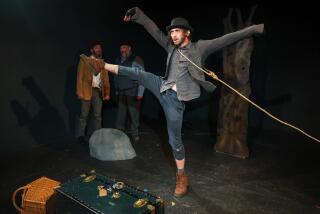A theater master speaks
Travis Hammer will direct “Waiting for Godot” as his senior project in the USC School of Theater this year. Like many college students, however, Hammer, from Alton, Ill., has never seen a production of Samuel Beckett’s modern masterwork.
Yet he does have a leg up on most would-be directors of “Godot.” This week, Hammer drove Sir Peter Hall around campus, in between Hall’s appearances at a series of lectures and workshops.
Hall directed the English language premiere of “Godot” in 1955 in London. And Hall’s Thursday afternoon lecture at USC focused primarily on Beckett and Harold Pinter. Hall emphasized the opening scenes of “Godot” and of Pinter’s “The Homecoming” -- the premiere of which Hall also staged, in 1965 in London.
“He’s an embodiment of theater,” Hammer said of the septuagenarian Hall, who co-founded the Royal Shakespeare Company and for 15 years directed the British National Theatre.
Not that the students in the USC School of Theater necessarily want to make a career in the theater. “The majority have their sights on the Hollywood machine,” Hammer said. He, however, does not. “I’m beginning to make my choice to turn my back on the film world,” Hammer said. “There are better people in theater.”
Perhaps Hammer will leave L.A. soon. During an open forum with about 25 students in the sunshine-dappled Intellectual Commons in USC’s Doheny Library, Hall replied to a questioner that “if any actor wants to put theater ahead of movies, he shouldn’t be in Los Angeles.”
Hall, who staged two Shakespeare plays at L.A.’s Ahmanson Theatre in 1999 and a third in 2001, cited the example of an actor who was right for a role at the Ahmanson but said he couldn’t do it because his agent had directed him to wait for more lucrative screen work.
“There, in a nutshell, is the problem,” Hall said. “The only theater you can do in L.A. is with a double cast” -- which enables actors to take time off for screen roles without jeopardizing the production.
Hall told a reporter that the Ahmanson -- with 1,600 seats at the minimum -- isn’t ideal for Shakespeare, “who needs at the most 800 or 900 seats. You have to be able to whisper as well as shout.” But to eliminate Shakespeare from the Ahmanson, he added, “would be like saying you can’t reproduce great paintings on paper.”
The Ahmanson connection was instrumental in bringing Hall to USC. His Ahmanson producer at the time, Madeline Puzo, is now the dean of USC’s theater school. “He has an amazing egalitarian approach,” Puzo remarked after watching Hall work with her students. “He never trots out who he is or how you should be impressed.”
He did lay down a few challenges, however. “Why don’t you speak Tennessee Williams properly?” he asked the students, referring to American actors in general. He faulted Marlon Brando’s “great performance” in “A Streetcar Named Desire” for leading Americans astray by “chopping up” Williams’ lines. “You have a great rhythmic dramatist, and you ignore his rhythms,” Hall said.
However, he told a student that learning Shakespeare does not necessarily entail going to England, where “you can still find enormous hostility to Shakespeare.”
Simply “do a lot of his plays” he advised. And don’t cut them. “Mostly we cut him because we don’t know how to do it. But an uncut ‘Hamlet’ is much more lucid.”
More to Read
The biggest entertainment stories
Get our big stories about Hollywood, film, television, music, arts, culture and more right in your inbox as soon as they publish.
You may occasionally receive promotional content from the Los Angeles Times.










